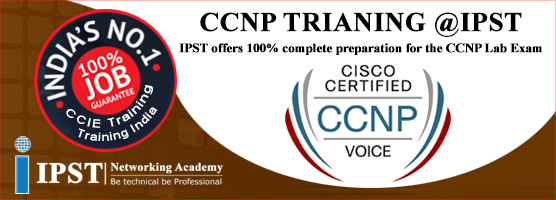All COURSES Offered
CCNP Voice Training
CCNP Voice Certification
Course Details
CCNP Security also known as professional level certification in Network Security discipline. This certification is basically meant for aspirants seeking career in field of network security of using vendor specific devices like ASA firewalls, Switches and IPS Systems.

CCNP Voice Certification
Introduction
Cisco Certified Network Professional – Voice
This certification prepares aspirant’s skillset necessary for combining collaboration and video apps in basic network structure. CCNP Voice certification aims at making its aspirants well equipped with knowledge and skills required for creating a clear, mappable, easy handled, and combined collaboration solution in a standard environment. Concepts like sound implementation of converged IP networks including its planning, operation, configuring and troubleshooting are also a part of CCNP Voice certification.
CCNP Voice certification is an intermediate level of certification in VoIP technologies, allowing candidates to acquire in depth knowledge on Cisco Unified Communications Manager (formerly Unified Call Manager), quality of service (QOS), gateways, gatekeepers, IP phones, voice applications, and utilities on Cisco routers and Cisco Catalyst switches.Apart from this combining and troubleshooting of Cisco Unified communication, Cisco Unity Connection and Cisco Unified Presence applications are also a part of CCNP Voice training offered by IPST.
Devices used while imparting training on Cisco CCNP Voice course is as follows:
Routers:2801, 2811, 3640, 3825, 2911 series
Switches:3550, 3560, 3750 series
IP Phones: 7960, 7961, 7970, 9971 series
Training Highlights
Your daily class at IPST begin with 2-3 hours of theoretical training which includes in-depth training on CCNP Voice course. After the theory class, practical sessions begin in our labs which are available 24x7, where you can practice and learn the actual working of the concepts learned for any number of hours you want to.
CCNP Voice course training is given by CCIE Voice (written) or CCIE Voice (lab) certified trainers with 5-14 years of industry experience.
CCNP Voice lab of NB consists of course specific devices: routers and switches with highly updated equipments and other required devices.
24x7 lab assistance while you are practicing in labs providing immediate solutions to problems occurring, ensuring uninterrupted high quality practical training.
Availability of Wi-Fi access to enhance your practical learning experience. Remote access to labs and devices within institute premises.
Access to in house practical workbooks within no time. Doubt sessions are also conducted in order to ensure complete understanding of each concept of the course.
IPST as a leading CCNP Voice course training provider institute offers quality training services to students wishing to become Voice certified professionals. With highly qualified Voice trainers having years of industry experience, NB strives to provide world class training to its students changing their professional lives forever. Our CCNP Voice course training program transforms fresher into voice professionals within just few months of rigorous training.
Course Contents
Implementing Cisco Voice Communications and QoS (CVOICE ) : 642-437
1. Describe a Dial Plan like numbering, digit manipulation, path selections, etc.
2. Describe the Basic Operation and Components Involved in a VoIP Call like RTP, RTCP, cRTP, and sRTP, H.323, MGCP, configure VLANs.
3. Implement Cisco Unified Communications Manager Express to Support Endpointsusing CLI ( DHCP, NTP, TFTP).
4. Describe the Components of a Gateway like functions, DSP functionality, codec and complexity, etc.
5. Configure and Implement a gGateway.
6. Implement Cisco Unified Border Element like features, functionality, address hiding, protocol and media internetworking, etc.
7. Describe the Need to Implement QoS for Voice and Video like causes, resolution measures, and requirements.
8. Describe and Configure the DiffServ QoS Model using marking based on CoS, DSCP, and IP Precedence, Configure layer 2 to layer 3 QoS mapping, etc.
Implementing Cisco Unified Communications Manager, Part 1 (CIPT1) : 642-447
1. Perform Initial Setup of a Cisco Unified Communications Manager Cluster (DHCP, TFTP, DNS, and NTP).
2. Describe and Configure Cisco Unified Communications Manager to Support On-Cluster Calling like Cisco unified communications manager groups, profiles, templates, device pools, etc.
3. Describe and Configure a Route Pplan for Cisco Unified Communications Manager to Support Off-Net Calling (implement gateways, configure route patterns, route groups and lists, etc.)
4. Describe and Configure Cisco Unified Communications Manager Media Resources (configure media resources, resource groups and lists, etc.).
5. Describe and Configure the Cisco Unified Communications Manager to Support Features and Applications like IP Phone services, Cisco unified communications manager native presence features, etc.
Implementing Cisco Unified Communications Manager, Part 2 (CIPT2) : 642-457
1. Describe and Implement Centralized Call Processing Redundancy like device fail over, MGCP fallback operations, redundancy operations verification, etc.
2. Describe and Configure a Multi-Site Dial Plan for Cisco Unified Communication Manager including issues, various differences between gateways, and trunks implementation.
3. Implement Call Control Discovery and Cisco Inter Company Media Exchange including service advertisement framework forwarder, client control, and call control discovery.
4. Implement Bandwidth Management and Call Admission Control like configuring locations, regions, implementing RSVP regions, SIP, etc.
5. Implement Mobility Features including Cisco unified communications manager device mobility and extension mobility.
Integrating Cisco Unified Communications Applications (CAPPS) : 642-467
1. Configure Cisco Unity Connection like call routing and management options, audio text applications, etc.
2. Configure, troubleshoot and integrate Cisco Unity Express using the GUI including Integrate Cisco unity express and Cisco unified communications manager express, etc.
3. Configure VPIM to network Cisco Unity Connection and Cisco Unity Express.
4. Implement Cisco Unified Presence solution with its features, communication flows, troubleshoot Cisco Unified Presence, integrate Cisco unified presence with Cisco unified communications manager and Cisco unified communications Manager.
Troubleshooting Cisco Unified Communications (TVOICE) : 642-427
1. Understand and Apply the Cisco Recommended Methodology used to Determine General Unified Communications System Problems and Issues, identifying tools for troubleshooting and monitoring.
2. Identify Aavailable Tools to Operate and Troubleshoot a Unified Communications System: describe apt tools for troubleshooting and monitoring, etc.
3. Troubleshoot Registration Issues with endpoint registration and gateway registration.
4. Troubleshoot Call Setup Issues including inter-site call setup, intra-site call setup, and off-net call setup issues.
5. Troubleshoot Database Issues like duplication issues in Cisco Unified Communications Manager.
6. Troubleshoot Call Control Discovery and Cisco Inter Company Media Exchange like service advertisement framework forwarder issues, service advertisement framework client control issues, etc.
7. Troubleshoot Application Issues like Cisco extension mobility, Cisco unified communications manager device mobility, etc.
8. Troubleshoot Media Resources including music on Hold, conference bridges, transcoders, etc.
9. Troubleshoot Voice Quality Issues like echo, dropped calls, audio quality issues, etc.
Course Duration : 5 month (100 hours including practicals)
Course Schedule
Various Date & Time schedule are given as below, any one of Batch/Track can be taken.
| Month | Batch/Track | Starting Date | Time |
| January To December | Morning | 15th of Every Month | 8:00 a.m - 10:00 a.m |
| Evening | 3.00 p.m - 6.00 p.m |
CCNP Voice is updated version of CCVP and is professional level certification in Voice over IP track offered by Cisco Systems. IPST offer CCNP Voice certification training in Gurgaon Center in Delhi NCR. Training is provided on Live CCNP Voice racks fully equipped with latest devices. CCNP Voice rack consists of 3 Cisco 2811 Series Routers, 1 3750 PoE Switch, 5 IP Phones of 7961 and 7965 series, Call Manager 9.0, Unity Connection 9.0 and CUPS Server.
Training Methodology:
Students will go through 2 Hours of classes from a CCIE Voice certified trainer, in which both theoretical and practical parts will be covered. Live CCNP Voice racks are already placed in classrooms to enhance practical learning. As it is impossible to deliver CCNP Voice training, if live CCNP Voice racks are not available in classrooms.
After completion of 2 Hours of Classes, you are free to practice in our labs fully equipped with multiple CCNP Voice racks. CCIE Voice certified lab instructors will be available in labs to help you out during practical sessions.
Labs of IPST are open 24x7, so you can practice in our labs for long hours without any restrictions. You can also come at nights to access labs.
You can access Silent and Discussion zone areas for self-study and group discussions with your batch mates and seniors.
Faculty: Team of over 250 highly experienced practical engineers with actual working experience (International Exposure).
Course Fees
The Classroom CCNP Training program conducted at IPST, Kanpur - India is priced at
INR 80,000*/- Pay Now
* All prices subject to a 14% Service Tax Charge. Rates are quoted in U.S. dollars, Britain Pounds and Nigerian Nairas are subject to change according to Foreign Exchange rates.
* For online Credit/Debit Card payment, surcharge 5% is charged to the Course fee.
Fee Payment Options:
1. Pay via Debit / Credit Card:
2. Pay Via Paypal:
(Paypal option will work only for payments made from outside India. PayPal cannot be used for domestic payments within India.)








